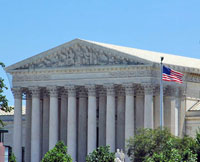High court says no to second Christian student appeal but trend continues
 The U.S. Supreme Court refused Monday to grant review for a second attempt to challenge school non-discrimination policies by saying they violate the free exercise of religion. But the conflict between the First Amendment and laws prohibiting discrimination is far from over, and at least one school has relaxed its policy rather than go to court in its defense.
The U.S. Supreme Court refused Monday to grant review for a second attempt to challenge school non-discrimination policies by saying they violate the free exercise of religion. But the conflict between the First Amendment and laws prohibiting discrimination is far from over, and at least one school has relaxed its policy rather than go to court in its defense.
A divided Supreme Court ruled last year that the First Amendment guarantee to free exercise of religion did not require that a religious student group be given official campus recognition and privileges when it refused to abide by a non-discrimination policy that all other student groups were required to abide by.
That 5 to 4 decision came in Christian Legal Society v. Martinez out of the University of California-San Francisco’s Hastings College of Law.
Supporters of campus Christian groups came back with another case with a slightly different sent of circumstances. This time, in Alpha Delta Chi v. Reed, the case emerged from the San Diego State University.
While the UC-SF policy requires all officially recognized student groups allow “all-comers” to be members and participate in group activities, the San Diego policy allows groups to “restrict membership to those individuals who agree with, support, or believe in the purpose that brought the group together, or to those individuals who agree with the particular ideology, belief, or philosophy the group seeks to promote.”
In Alpha Delta, the Alliance Defense Network was representing two Christian social groups, Alpha Delta Chi sorority and the Alpha Gamma Omego fraternity. The groups require members to actively participate in and adhere to Christian “evangelical” principles.
The Alliance said San Diego State refused official status to two groups because the groups “require [their members and/or officers] to profess a specific religious belief.”
The Ninth Circuit U.S. Court of Appeals took prominent notice of last year’s Christian Legal decision when it issued its opinion last August in Alpha Delta. It made note that the Supreme Court had held out the possibility that it might rule differently, depending on the exact wording of a university’s non-discrimination policy.
But the Ninth Circuit ruled that the Alpha Delta circumstances were not significantly different from those of the Christian Legal case.
The Alliance’s petition to the high court argued the San Diego policy is different in a significant way. While the UC-SF policy requires all officially recognized student groups be open to “all-comers,” noted the Alliance, the San Diego policy allows groups to “restrict membership to those individuals who agree with, support, or believe in the purpose that brought the group together, or to those individuals who agree with the particular ideology, belief, or philosophy the group seeks to promote.”
“Thus, under SDSU’s policy,” noted the Alliances’ petition, “all student groups may exclude students from membership and leadership who do not agree with the groups’ beliefs, except religious student groups.” And that, it argues, is discrimination based on the free exercise of religion.
The Christian Legal Society, which sponsored the San Francisco Christian student group, filed a brief in support of the San Diego case, arguing that the policy at San Diego was different from San Francisco. It also argued that the high court’s recent decision in another free exercise case, Hosanna-Tabor v. EEOC. In that case, the high court ruled that the First Amendment bars discrimination lawsuits by “ministers” against their “churches.”
“It is common sense, not discrimination,” said the Christian Legal Society, “for religious groups to require their leaders to agree with their religious beliefs.”
By refusing to take the Alpha Delta appeal, the high court does not necessarily signal the justices’ rejection of the argument. The court takes only about 100 appeals out of 10,000 filed per term. But the refusal to accept the appeal does leave the Ninth Circuit decision intact.
Alpha Delta and Christian Legal are just two of many cases attempting to challenge non-discrimination laws and policies through arguments of free exercise. A similar case at the University of North Carolina-Greensboro settled out of court March 13. At first, UNC officials denied campus recognition to a pro-abstinence and anti-abortion group called “Make Up Your Own Mind” that requires members to support a Christian statement. The university noted that the group was affiliated with a local pregnancy care clinic, not a church. The school relented after the Alliance filed a lawsuit in federal district court.


Leave a Reply